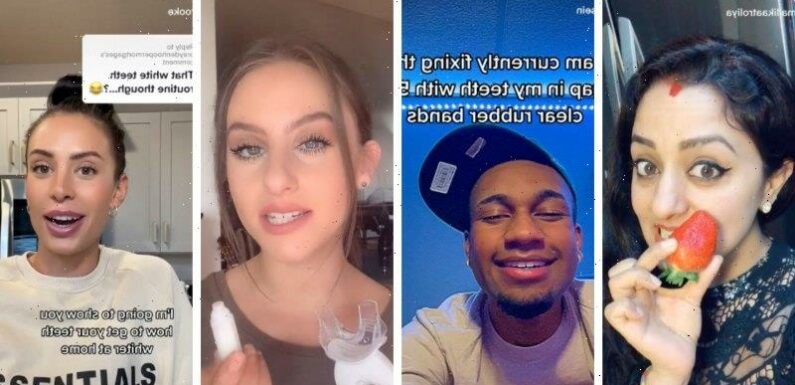
Social media users have been warned about teeth bleaching and straightening “hacks” using pantry items, which can cause damage and cost thousands of dollars to correct.
Dr Stephen Liew, who at 39 is the youngest ever president of the Australian Dental Association, said he was deeply concerned by some of the dental advice and products he saw while scrolling Instagram and TikTok.
Melbourne dentist Dr Stephen Liew says he is concerned an obsession with white teeth is driving young people to damage their dentures.Credit:Justin McManus
Viral social media videos show influencers using acidic fruits such as lemons and kiwi fruit to whiten teeth, or making abrasive “toothpastes” with charcoal and sand, or even peroxide. But Liew said all these pantry remedies were far too abrasive or acidic for teeth.
“I guess what you always have to ask when you see something on Instagram or TikTok is: if this is as safe and effective as they are making out, why isn’t it something a dentist does?”
A consumer survey of 25,000 people conducted by the association and published earlier this year found 22 per cent of Australian adults had whitened their teeth, up from 8 per cent when the same question was asked in 2017.
Only a third of people said they had whitening while under the supervision of a dentist. Of the rest, 39 per cent purchased a teeth whitening kit online. Artificial whitening was most common among people aged 24 to 34.
DIY dental hacks attract millions of views on TikTok.Credit:TikTok
Liew said he was also concerned photo and video filters had created a warped perception of how normal teeth looked, particularly when it comes to whiteness.
“The body dysmorphism is being pushed so far by social media,” he said, adding that the colour of teeth did not necessarily indicate their health, and methods being touted as “teeth whitening hacks” by content creators online could lead to enamel and gum damage which costs thousands to correct.
Although the Australian Dental Association repeatedly raises concerns about whitening products to the ACCC, online dentistry generally sits in a regulatory grey area: the ineffective DIY hacks are not advertising a product, the people performing them are not health professionals who can lose their registration, and teeth whitening products sold at supermarkets generally do not contain high enough concentrations of key ingredients to be considered a therapeutic good and thus subject to oversight by the medicines regulator.
Liew said this last point was something for people viewing sponsored content on social media to bear in mind: if the product contains cabramide peroxide or hydrogen peroxide to levels used by dentists, influencers would probably not be able to deliver testimonials about its use, as per the regulator’s new advertising code.
The ACCC will deliver the next interim report of its digital platform services inquiry, focusing on the role of advertising services and use and abuse of social media for misleading or deceptive content, in March.
Teeth straightening is another area of concern, with Liew warning against using elastic bands, as has been demonstrated by some Tiktok users, to close gaps.
The nation’s orthodontists have previously raised concern about a proliferation of online retainer businesses, which require consumers to make their own moulds of their teeth before receiving the device in the post.
Tiktok users @hondroutwins and @rae.brook promoting dental techniques online. Credit:@hondroutwins/@rae.brook
Earlier this month, the Federal Court ordered online teeth aligner provider Smile Direct Club to pay $3.5 million following action by the ACCC regarding misleading statements made in its advertising, incorrectly stating its products could be claimed on most private health insurance policies.
People who purchased the product under the pretence they would be able to claim it back on their insurance are eligible for a refund.
Actor Rob Mills and several local influencers had appeared in paid promotion social media posts for Smile Direct Club, which boasts on its website being fitted for the aligners is “as easy as taking a selfie” and uploading it to its app.
Liew said the association welcomed the decision, as it showed “the ACCC is very aware of the inundation of products that may have false claims and they will investigate”.
The Morning Edition newsletter is our guide to the day’s most important and interesting stories, analysis and insights. Sign up here.
Most Viewed in National
From our partners
Source: Read Full Article


